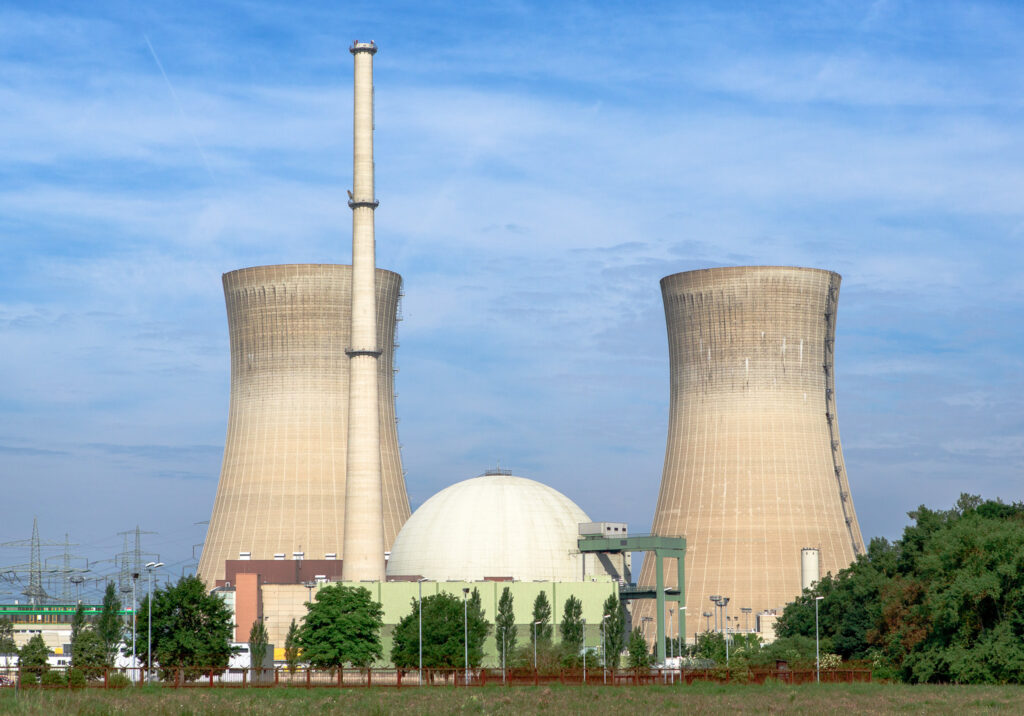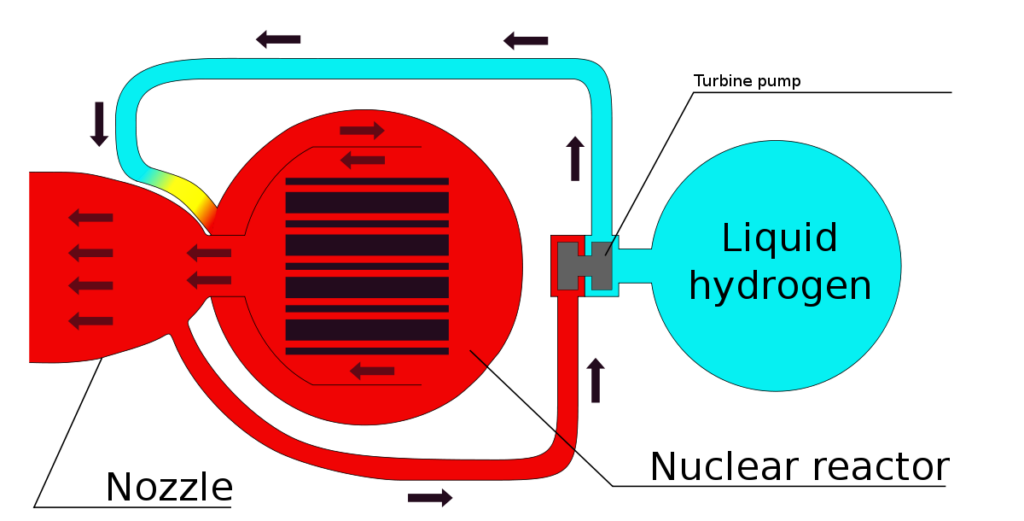In this article the conversion of nuclear energy to mechanical energy with their examples are going to be described.
In a nuclear reactor nuclear fission reactions are the sources of thermal energy. As two lighter nuclei are produced from a heavy uranium nuclei in the fission reaction,heat is released followed by 3 faster neutrons. Nuclear energy is converted to thermal energy at the first stage.
After that this thermal energy activates the generator which is the cause of rotation of the turbines. In this way thermal energy is changed into kinetic energy i.e, mechanical energy during the rotation of the blades of the turbine.
How is nuclear energy converted to Mechanical energy?
Nuclear fission reactions are the sources of thermal energy produced from nuclear energy. In this reaction a heavy uranium nucleus is fragmented to two lighter nuclei of barium and krypton and three faster neutrons. Other than this a huge amount of heat is liberated in this type of a reaction.
92U235 + 0n1 → 56Ba141 + 36Kr92 +3 0n1
Now this thermal energy drives the generator which in turn helps the blades of the turbine to rotate. In this way thermal energy is converted into mechanical energy. After this the mechanical energy turns into electrical energy. So nuclear energy to mechanical energy conversion is an intermediate step of working of a nuclear power plant.
Nuclear energy to Mechanical energy examples
20+ examples of nuclear energy to mechanical energy conversion with their detailed facts are stated below:
- Nuclear fission reactors
- Nuclear fusion reactors
- Pressurized water reactor (PWR)
- Nuclear steam generator
- Nuclear power plants
- Thermonuclear bomb
- Nuclear thermal rocket
- Nuclear electric rocket
- Nuclear submarines
- Nuclear aircraft
- Nuclear powered ships
- Nuclear motor systems
- Earth penetrating weapon
- Nuclear shells
- Nuclear ballistic missiles
- Nuclear surface to air missiles
- Nuclear fission sail
- Nuclear fission fragment rocket
- Radioisotope rocket
- Nuclear warheads
Nuclear fission reactors
Nuclear fission reactors are the most crucial example of nuclear energy to mechanical energy conversion. Mainly these reactors are used to generate electricity. In the process of production of electricity an intermediate step is nuclear energy to mechanical energy conversion. Nuclear fission reactions are the basis of a nuclear reactor.
Nuclear fusion reactors
Nuclear fusion reactors are another most crucial example of nuclear energy to mechanical energy conversion. In this type of a reactor nuclear fusion reactions take place.
Pressurized water reactor (PWR)
This is an important nuclear energy to mechanical energy conversion example. Water at a pressure of 150 atm is used in its core.

Nuclear steam generator
The steam inside the steam generator activates the electric generator which produces electricity.
Nuclear power plants
Nuclear fission reactions are the source of nuclear energy to thermal energy conversion in a nuclear power plant. After the first stage of fission is completed,the thermal energy is changed into mechanical energy which in turn is converted into electrical energy.

Thermonuclear bomb
Nuclear energy is turned into mechanical energy during the explosion caused by this type of a bomb.
Nuclear thermal rocket
Its working principle is similar to a nuclear fission fragment rocket. It uses liquid hydrogen as a propellant.

Nuclear electric rocket
The engine of this spacecraft propulsion system contains a nuclear reactor in which nuclear energy is changed to thermal energy. This thermal energy then turns into mechanical energy and at last electricity.
Nuclear submarines
Nuclear submarines used to work on the principle of nuclear fission reactors. Uranium atoms split to liberate thermal energy which in turn produces steam at a high pressure. This steam is used in activating the turbine. In this way nuclear energy to mechanical energy transformation occurs.

Nuclear aircraft
Nuclear aircraft have the same working principle as the nuclear submarines.
Nuclear powered ships
Nuclear powered ships are another most important example of nuclear energy to mechanical energy conversion.
Nuclear motor systems
In a nuclear motor system at first nuclear energy is changed into electricity which in turn is turned into mechanical energy. It is a very important example of nuclear energy to mechanical energy conversion.
Earth penetrating weapon
This nuclear weapon is used to attack the targets that are under the ground. In this weapon also nuclear energy is turned to mechanical energy through blast.
Nuclear shells
A cannon is responsible for the delivery of a nuclear artillery associated nuclear shell. This nuclear weapon is another most notable example of transformation from nuclear energy to mechanical energy.
Nuclear ballistic missiles
To properly deliver a payload to the required target a particular ballistic trajectory is followed by this missile. They used to carry nuclear munitions and high explosives. This is a well known nuclear weapon in which nuclear energy is converted into mechanical energy,thermal energy and light energy through blast.
Nuclear surface to air missiles
Military aircraft use this type of missiles to attack their targets on the plane and the seas. In this missile also nuclear energy to mechanical energy conversion occurs through explosions.
Nuclear fission sail
This type of a spacecraft is usually propelled by fission fragments. It is nearly the same as a solar sail. Its working principle is dependent upon the nuclear fission reaction. Hence the conversion procedure of nuclear energy to mechanical energy is also the same as a nuclear fission reactor.
Nuclear fission fragment rocket
Nuclear fission fragment rockets can be used to obtain very high specific impulse. A thrust which signifies the mechanical energy(more specifically kinetic energy) is generated by the by-products that are produced in the nuclear fission reaction.
Radioisotope rocket
The working principle of a radioisotope rocket is based upon the decay of radioactive substances. This rocket is also a very important example of conversion of nuclear energy to mechanical energy. In this rocket the source of nuclear energy is the decay of radioactive substances.
This nuclear energy produces an upward thrust which helps the rocket to move in the sky. This thrust signifies the mechanical energy or more specifically the kinetic energy.
Nuclear warheads
This is another nuclear weapon in which nuclear energy to mechanical energy(blast energy) conversion occurs through explosions. Here a part of nuclear energy is also changed into thermal energy and light energy.
Also Read:
- How to calculate thermal energy transfer in a heat pump system
- Example of mechanical to kinetic energy
- How to maintain mechanical energy conservation in a complex machine
- Quantum energy examples
- Why does energy vary in different inertial frames
- How to enhance radiant energy usage in light based communication systems
- How to find kinetic energy just before it hits the ground
- Solar energy to electrical energy
- How to calculate energy in a cyclotron motion
- How to optimize radiant energy in architectural lighting designs
Hi…I am Ankita Biswas. I have done my B.Sc in physics Honours and my M.Sc in Electronics. Currently, I am working as a Physics teacher in a Higher Secondary School. I am very enthusiastic about the high-energy physics field. I love to write complicated physics concepts in understandable and simple words.